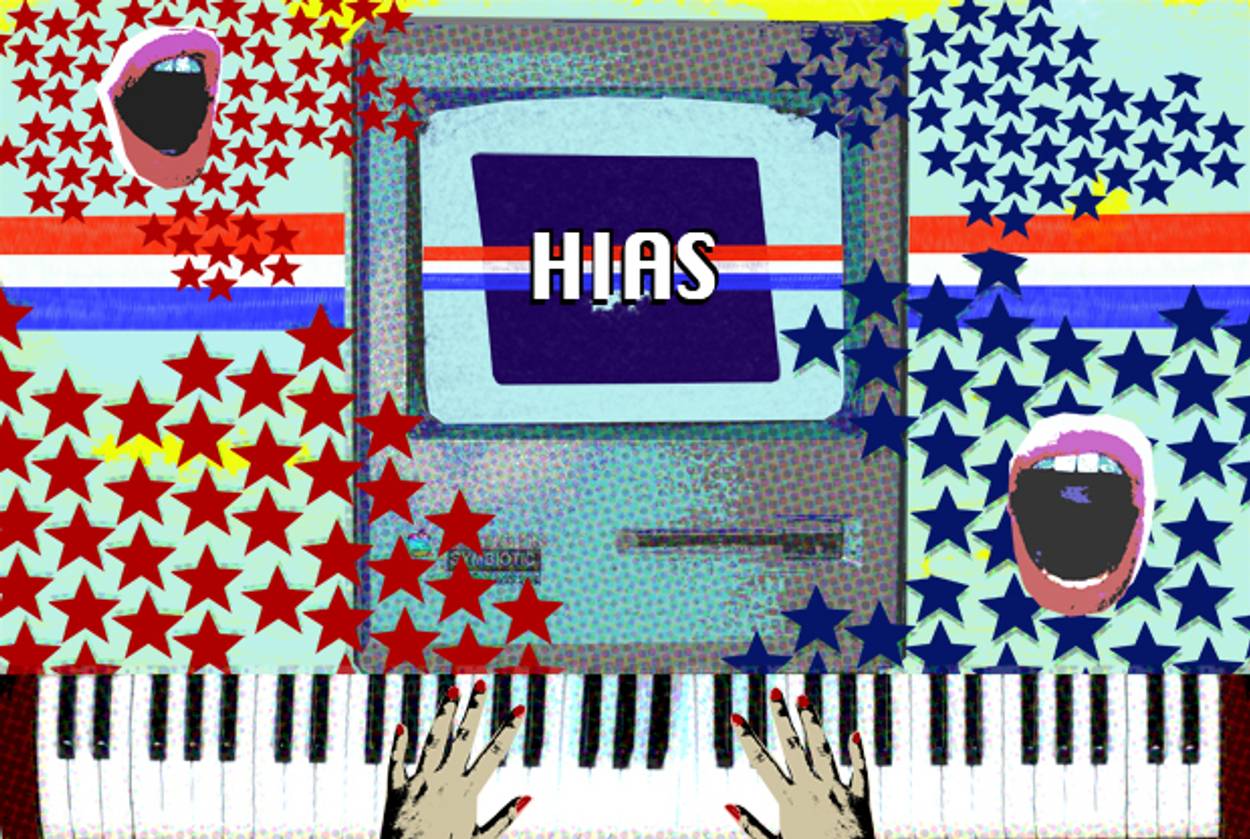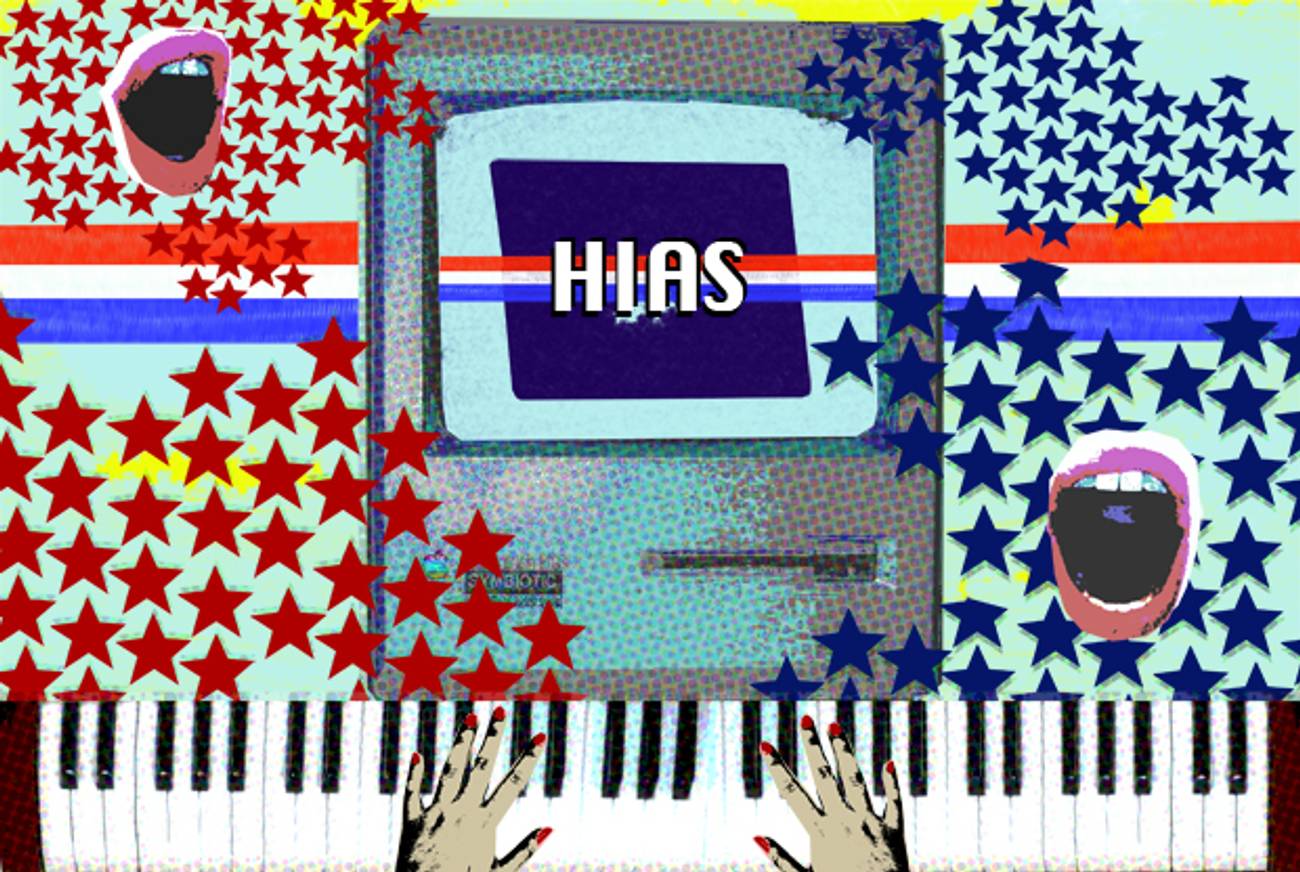Regina Spektor’s Immigrant Aid
The Russian-Jewish indie star headlines a benefit for HIAS, the Hebrew Immigrant Aid Society, an aging philanthropy seeking new attention




“For the most part,” Regina Spektor told me after a recent concert at Lincoln Center in New York, “I’ve been making music in the time of the Internet. Anything I make, even if there’s not a specific place in society for it, I try to just put it online. Let it find its own way.” It may have, but not to me. All it took for me to ignore Spektor’s entire musical career was my decision—made, let’s say, in 2004—to be into “independent music.” I would listen to lo-fi rockers Guided by Voices, and a program’s algorithm would recommend Sebadoh, for example, but nary a cute Russian. Yet Spektor’s music, in a different era, could be universal.
Before I attended Spektor’s benefit concert for HIAS, the Hebrew Immigrant Aid Society, at Lincoln Center a few weeks ago, only one song of hers had broken into my self-curated indie/punk/metal/rap bubble, a song I quickly started referring to as the “it breaks my heart” song. Perhaps you know it by its actual name, “Fidelity.” On display in “Fidelity” is what I would later discover is her trademark: a delightful playfulness with the words of the English language, stretching and bending their sounds to her will, perhaps in a way only an immigrant can, as in “breaks my hea-a-a-a-a-a-rt.” Spektor is Russian-American and Jewish—and a benefit for HIAS was explicitly one of personal passion.
So, how did a Russian immigrant emerge as a lasting force in indie music, one so powerful she could force her voice onto ears that hadn’t even been searching for it in the first place? That’s the big question here, and one I intend to answer. There’s a secondary question that might sound a little self-indulgent at first, but it’s related, I promise. I’m supposed to be aware of new musicians and important political movements like Regina Spektor and HIAS, for personal and professional reasons. How had I completely missed them both?
Let’s start with HIAS, the more forgivable of the two. HIAS’s age shows in its name—it is 130 years old—an acronym from the same era as the NAACP. But unlike the NAACP, HIAS’s mission has broadened and diluted over the years, expanding from Jewish immigrants to people all over the world. Many of these causes still have a Jewish touch, though: like trauma counseling in Chad for victims of violence in the Darfur region of Sudan, a popular cause among Jewish clergy nationwide. HIAS runs a Resettlement Support Center in Vienna for those fleeing religious tyranny in Iran, another locale on Jewish minds. But, and perhaps this is because of Judaism’s lack of proselytizing, international volunteerism of this sort has never taken hold the way it has in, say, Evangelical communities. Spektor’s concert, an excited young HIAS volunteer told me, was an attempt to make Americans more aware of an organization that might have brought their great-grandparents food when they could not speak the language. She was wearing a large red “Ask Me About HIAS” button and spoke in hushed tones about the years it had taken for this concert to see itself to fruition. The concert had been promoted by many, including the president of HIAS, Gideon Aronoff, as a showcase of the capabilities of its Young Leaders, its “national community of young professionals and graduate students,” as the HIAS website has it. As I walked around the lush Rose Hall and saw the mix of young professionals and moneyed donors (more on the audience later), with “130th Anniversary” signs written in script all around, it felt like the concert might be the beginning of a new story rather than a tribute to the organization’s past.
There couldn’t possibly be a better person for this task then Spektor. Born in Moscow 11 years before Perestroika, Spektor got out of the Soviet Union with her family when she was 9 years old. She has recorded a video for HIAS telling her family’s story, and it is not a grandiose, exciting tale, full of smuggling and the adventures we have come to associate with immigration. Rather, it’s a story of smaller details—imagining the Viennese refugee camp would be full of talking animals, of not being able to afford to buy gelato in Rome, of eventually finding that perfect home in Kingsbridge two doors down from her cousin. It’s the type of small, quiet success that doesn’t get a lot of headlines but feels tremendously important when you hear it. Spektor considers New York to be her home but clearly values the work HIAS does.
Since she began her career as a recording artist and performer, Spektor has navigated her way to one of the higher planes of musical success available, pop celebrity (an announcement about her upcoming album’s artwork earned a story in Rolling Stone), and as a pianist to boot. Her last studio album, 2009’s Far, sold 50,000 copies, entering the Billboard 200 chart at #3 and hanging around for 19 weeks. This year she is releasing What We Saw From the Cheap Seats. Based on the surprisingly tense first single, “All the Rowboats,” there’s no reason to think that those numbers will fall off. It’s a smart song, lamenting art that rusts away in a museum. It is the type of package that made artists ranging from Joni Mitchell and Elliott Smith so popular—biting sarcasm and earnest emotion, playing out over a usually very pretty melody. Something for everyone, including a 130-year-old organization looking for a reboot.
Wrapped around Rose Hall, home of Jazz at Lincoln Center, are the Shops at the Columbus Circle, a mall filled with Bose speakers, Cole Haan shoes, a “modern take on the classic steakhouse,” and other such mildly bland offerings. The Shops are the paragon of respectability. The Shops at Columbus Circle do not look forward. Rather people look to them, for their definitions of modern wealth as well as stability, because the type of wealth that migrates toward Columbus Circle never changes. Not gaudy, just aspirational. To dream a little dream, where HIAS is on every weekly Jewish newspaper’s front page and every donor’s Form 1080, Schedule A.
And who’s to say they’re wrong? The blue womb that is the inside of Rose Hall was filled with all sorts—there were a few couples in their thirties celebrating birthdays or anniversaries by attending A Fancy Evening With Regina. The men were wearing suits with an odd touch, like patches or skinny ties, and the women had colorful dresses. But generally there were HIAS employees, Youth Leaders, and the over-40 crowd, who are all dressed professionally. As I wandered the crowd, I heard more questions asked in Eastern European accents about who this Regina Spektor was. As an organization, HIAS was probably aiming for some sort of middle ground: HIAS wasn’t holding a benefit at Lincoln Center with one of the top pop artists in the country just to keep the same donors they had last year. The Regina Spektor Benefit Concert was aiming its coolness at the wealthy middle-aged donor, someone who maybe didn’t have any personal connection with the organization, but who would donate to HIAS if they only knew more. Step One—get them in the door: done. Now they just had to listen.
Before Spektor’s part in the show, there were HIAS trivia questions, video presentations, and an awkward introduction. Yet when Spektor walked on stage, that awkwardness left the theater: Here was a professional. We’d been told several times that she was sick, and she started off talking about old Russian remedies that had been failing her, and then she proceeded to give a performance that, for someone that sick, could only be described as “Jordan, Game 5, 1997.” The illness brought out the best of her, and the crowd continually roared its approval. She went on for over two hours without a break, through songs and albums from every stage of her career. Highlights included her standby crowd-stopper “Poor Little Rich Boy,” a theatrical piece where Spektor becomes a one-woman band, keeping rhythm on a stool while singing and playing piano. Even if you noted the irony of playing a song with that title to a crowd full of benefactors, it was still a remarkable effort.
Sitting in the audience, I was embarrassed that hardly any of these songs were familiar. I had listened to a few of her albums ahead of time as research, but not enough to call out lyrics Spektor forgot, which eager fans happily did more than once during the night’s performance.
The reason self-curation works is that it creates that thing we’re drawn to above all others: narrative. If point A leads to point B, then we can take comfort in reaching point C after that. These narratives lead to self-identity, which is what made the words “Jewish issues” synonymous with Israel. Yes, American Jews have come out en masse for other issues, but never as consistently as they do for Israel. Immigration, genocide, hunger, illiteracy, homelessness: These passions come and go, but Israel remains. American Jews have been fairly rigid since 1948, not unlike my musical tastes since 2004, assuredly something that has led to HIAS’s shrinking from the public eye. Making the desert bloom was deemed more noble then settling in Brooklyn, and how could it not be, to Americans? Just look at Exodus, the 1960 epic film about Israel’s founding. It’s trailer says it all: a larger-than-life epic, filled with people like Lee J. Cobb urging you to “Fight! Not beg, but fight!” and people who look like Paul Newman, sighing with determination. These are the things any ethnic group in America wants. How on Earth could this not become the main thing that gets Jewish-Americans to open up their pocketbooks?
Yet, HIAS persists. The Spektor concert was, it was made clear, a work of its Youth Leader program, the “young professionals and graduate students” noted above. Over the course of post-concert drinks, some of these young professionals were called up to receive prizes for their work on the Regina Spektor Steering Committee. That night, the joys and pains of philanthropy were clear on their faces. Months—years in some cases—of hard work were over, and all they could do was pray. For money, for relevancy. There was no way to determine if what had just been pulled off would lead to a long-term success, only chocolate mousse and free drinks. Spektor hadn’t mentioned HIAS once during the show; “a concert is a concert,” a Young Leader told me, sounding an awful lot like what a press agent for Spektor might have told her to say. But it didn’t matter: People showed up, people talked. Spektor’s fame and talent had proven large enough to rub up against, in a way that was pure and true.
CORRECTION, April 25: This article originally stated that Regina Spektor left the Soviet Union at age 4. In fact, she left at age 9. The error has been corrected.
David Meir Grossman is a writer living in Brooklyn. His Twitter feed is @davidgross_man.
David Meir Grossman is a writer living in Brooklyn. His Twitter feed is @davidgross_man.